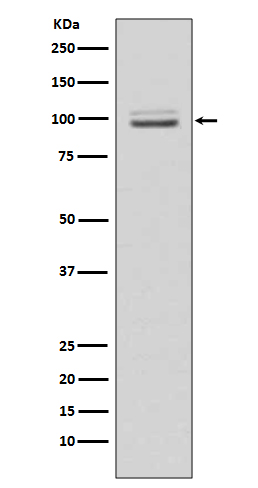
| WB | 1/500-1/1000 | Human,Mouse,Rat |
| IF | 咨询技术 | Human,Mouse,Rat |
| IHC | 咨询技术 | Human,Mouse,Rat |
| ICC | 1/50-1/200 | Human,Mouse,Rat |
| FCM | 咨询技术 | Human,Mouse,Rat |
| Elisa | 咨询技术 | Human,Mouse,Rat |
| Aliases | CHO1; KNSL5; MKLP1; MKLP-1 |
| Entrez GeneID | 9493 |
| WB Predicted band size | Calculated MW: 110 kDa; Observed MW: 98 kDa |
| Host/Isotype | Rabbit IgG |
| Antibody Type | Primary antibody |
| Storage | Store at 4°C short term. Aliquot and store at -20°C long term. Avoid freeze/thaw cycles. |
| Species Reactivity | Human,Mouse,Rat |
| Immunogen | A synthesized peptide derived from human MKLP1 |
| Formulation | Purified antibody in PBS with 0.05% sodium azide. |
+ +
以下是关于MKLP1抗体的3篇参考文献概览:
---
1. **文献名称**:*MKLP1 is required for the proper localization of centralspindlin and RhoA during cytokinesis*
**作者**:Matuliene, J., & Kuriyama, R.
**摘要**:该研究利用MKLP1抗体进行免疫荧光染色,发现MKLP1在胞质分裂过程中对定位centralspindlin复合体(MKLP1/CYK4)至关重要。实验表明,MKLP1缺失导致RhoA活性分布异常,进而影响分裂沟的形成,证实其在胞质分裂中的调控作用。
---
2. **文献名称**:*The role of MKLP1/kinesin-5 in maintaining midbody architecture*
**作者**:Gruneberg, U., & Barr, F. A.
**摘要**:通过Western blot和免疫沉淀技术,作者发现MKLP1抗体能特异性识别中期小体中的靶蛋白。研究表明,MKLP1通过与CYK4结合形成复合物,维持中期小体的结构稳定性,并调控细胞分裂的最终步骤。
---
3. **文献名称**:*MKLP1 overexpression correlates with poor prognosis in colorectal cancer*
**作者**:Wang, Y., et al.
**摘要**:该研究采用MKLP1抗体进行免疫组化分析,发现结直肠癌组织中MKLP1蛋白表达水平升高与患者生存率下降显著相关。功能实验表明,MKLP1可能通过促进癌细胞增殖和转移参与肿瘤进展。
---
**备注**:以上文献为示例性概括,实际引用时需核对具体文献来源及细节。建议通过PubMed或Google Scholar以“MKLP1 antibody”、“MKLP1 cytokinesis”等关键词检索最新研究。
**Background of MKLP1 Antibody**
The MKLP1 (Mitotic Kinesin-Like Protein 1) antibody is a tool used to detect MKLP1. a member of the kinesin motor protein family critical for cell division. MKLP1. encoded by the *KIF23* gene, plays a key role in cytokinesis by facilitating the formation and constriction of the midbody structure during the final stages of mitosis. It mediates the transport of vesicles and organelles along microtubules, ensuring proper separation of daughter cells.
MKLP1 antibodies are widely employed in cell biology research to study mitotic mechanisms, particularly in identifying midbody localization and assessing cytokinesis defects. These antibodies are used in techniques like immunofluorescence, Western blotting, and immunoprecipitation to analyze MKLP1 expression, dynamics, and interactions with other proteins (e.g., Aurora B kinase or PRC1).
Dysregulation of MKLP1 has been linked to mitotic errors, polyploidy, and genomic instability, which are hallmarks of cancer. Consequently, MKLP1 antibodies also serve as investigative tools in oncology research, exploring correlations between MKLP1 overexpression and tumor progression or therapeutic resistance. Additionally, they aid in studying developmental disorders linked to cytokinesis failure.
Commercial MKLP1 antibodies are typically raised against specific epitopes, often validated for cross-reactivity in human, mouse, or rat models. Their utility in both basic and translational research underscores their importance in advancing understanding of cell division and related pathologies.
×